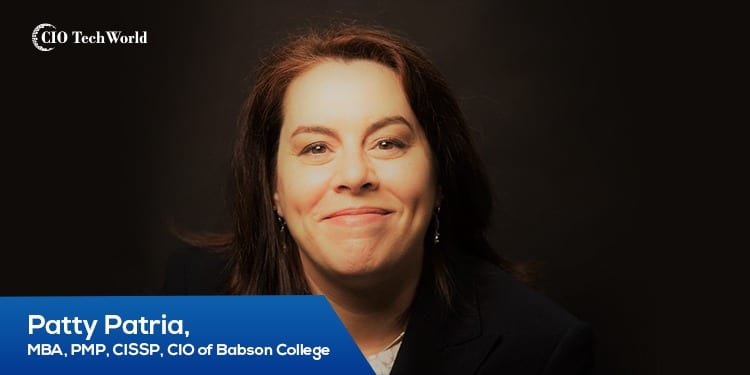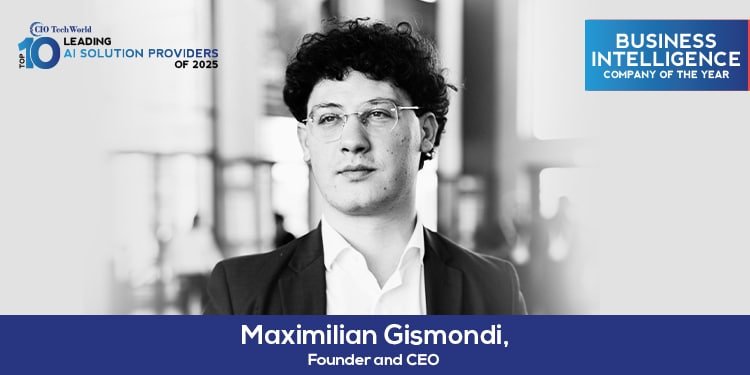Patty Patria’s journey to CIO exemplifies the power of perseverance and continuous learning. Starting as a history graduate, she found her way into technology by chance when she took on the responsibility of implementing a CRM system at a bank, where she worked, despite her non-technical background. Taking it upon herself to master CRM implementation and support, Patty Patria completed the project successfully.
Later, Patty Patria pursued an MBA in Computer Information Systems from Suffolk University to bolster her technical skills. Over time, she earned various certifications including Project Management Professional (PMP), Certified Information Systems Security Professional (CISSP), and Prosci Change Management Professional. Her career progressed from Project Manager roles at Surebridge and then as the Manager of Development for Business Applications at Monster, to Chief Information Security Administrator at Bentley University. Patty Patria holds the CIO position at Babson College, having previously served in the same capacity at Becker College and Worcester Polytechnic Institute. Throughout her career spanning over two and a half decades in technology, Patty Patria has dedicated more than 13 years to CIO roles.
This interview with Patty Patria explores her remarkable career path, offering insightful perspectives drawn from her personal experiences to guide others aspiring to climb the CXO ladder.
Describe your career progression from the start to where you are and what pivotal decisions, moves you made, circumstances, and other facts that facilitated your growth.
I have an interesting journey to the CIO role. I initially studied History as an undergraduate, thinking I wanted to be a lawyer. But after working in law firms for a year after graduation, I decided that was not my path. I ended up working in a bank, where they needed someone to set up a new CRM system. I volunteered to set up their system, and that led to an opportunity as a Customer Relationship Management consultant in my early twenties.
Working for a small CRM company was a pivotal point in my career, as I learned the entire lifecycle of software in a few short years, from presales to design to implementation to training and support. Although I loved working with tech, I also realized I needed additional skills and decided to get my MBA at night, while working full time. Although that was really challenging, it was well worth it, as I learned the foundations for everything I need to succeed on a daily basis.
After my work as a CRM consultant, I jumped into the dot com world for about a year, managing the CRM system at Monster.com. Although I learned a lot, the pace was a bit intense, and I decided to try the higher education route, managing projects, which I loved. I started my higher education career at Bentley University, where managed all of their technology projects, and moved on to the Director of the PMO, and early 2010 when security became increasingly important, Bently asked me to take on the role of their Information Security Officer. Although I did not have direct experience with security, it was one of my pivotal career moments. I worked hard to learn all aspects of security, including getting my Certified Information Systems Security Professional (CISSP), which is the most challenging exam I have ever taken! From there, I had a great background in software, project management, and security, and it was a natural transition to move to the CIO role. Having been a CIO at 3 different institutions over 13+ years, I have learned how to work in small and large organizations, with all types of faculty and staff, on all types of projects.
Currently, at Babson as their CIO, I feel we are again at a pivotal moment with AI. In the last year, working collectively with our amazing faculty and staff, we have been able to able to build a comprehensive AI program that is going to change the way students learn and succeed. For professionals that embrace this change, and learn how to work differently, this will be another major catapult to both careers and organizations.
What are the key skills and qualifications that aspiring tech executives in the tech industry should focus on developing to enhance their career prospects?
– Strategic thinking and vision: Tech executives need to be able to see the big picture and align their goals and initiatives with the organization’s mission and values. They also need to anticipate future trends and challenges and devise innovative solutions that create value and competitive advantage.
– Business acumen and financial literacy: Tech executives need to understand how their decisions and actions affect the bottom line and the overall performance of the organization. They need to be able to communicate the business value and impact of their projects and proposals and justify the return on investment and resources.
– Leadership and influence: Tech executives need to be able to inspire, motivate, and empower their teams and stakeholders. They need to foster a culture of collaboration, accountability, and excellence. They also need to be able to influence and persuade senior management, board members, and external partners to support their vision and initiatives.
– Change management and agility: Tech executives need to be able to adapt to changing environments and demands and lead their teams through transitions and transformations. They need to be flexible and resilient and embrace change as an opportunity for growth and improvement. They also need to be able to manage risks and uncertainties and mitigate potential issues and conflicts.
What are some key milestones or achievements that tech executives should aim for at various stages of their career to demonstrate their growth and readiness for higher-level roles?
– Early career: Successfully complete challenging projects that demonstrate technical skills, problem-solving abilities, and creativity. Seek feedback and learning opportunities from peers, managers, and mentors. Gain exposure to different aspects of the business and understand how technology supports its goals and needs. Acquire relevant certifications or credentials that showcase domain expertise and industry standards.
– Mid-career: Lead complex and cross-functional projects that deliver value and innovation to the organization and its customers. Develop leadership skills such as communication, collaboration, delegation, and decision-making. Pursue advanced degrees or executive education programs that enhance strategic thinking and business acumen.
– Senior career: Manage digital transformation initiatives and align technology strategy with business strategy and vision. Drive change and agility across the organization and foster a culture of excellence and innovation. Identify and leverage emerging technologies and trends that create competitive advantage and growth opportunities. Influence and persuade senior management, board members, and external partners to support and invest in technology initiatives. Demonstrate thought leadership and contribute to the tech community and industry.
How important is it for tech executives to actively seek out mentorship or coaching opportunities to advance their careers? What benefits can they derive from such relationships?
Mentorship and coaching are essential for tech executives to advance their careers, as they can provide valuable guidance, feedback, and support. Tech executives can benefit from mentorship and coaching in several ways, such as:
– Developing new skills and competencies that are relevant to their current and future roles. For example, a tech executive who wants to transition from a technical to a business role might seek a mentor who has made a similar shift and can advise on the best practices, challenges, and opportunities.
– Gaining insights and perspectives from different sources and experiences. A coach can help a tech executive identify their strengths, weaknesses, blind spots, and areas of improvement, and suggest strategies and actions to address them. A mentor can share their lessons learned, successes, and failures, and offer wisdom and inspiration.
– Enhancing their confidence and motivation. A mentor or a coach can provide positive reinforcement, recognition, and encouragement to a tech executive, and help them overcome doubts, fears, or challenges. They can also challenge and push a tech executive to step out of their comfort zone and pursue their goals.
In your experience, what role does professional networking play in the career progression of tech executives? How can tech executives effectively build and leverage their networks?
Professional networking is critical to your career. A strong network can help tech executives find new partners, mentors, or talent, as well as learn about emerging trends, best practices, innovations, or threats in the industry. A network can also provide referrals, recommendations, or introductions that can open doors and accelerate career growth. I participate in industry-specific networks like NERCOMP and Educause, but I am also a member of regional and national networks like Boston CIO and Workday’s CIO Advisory Council. Each network connects me with great leaders that I can learn from and share my experiences with.
Are there any specific certifications, advanced degrees, or executive education programs that can significantly enhance the career prospects of tech executives in the tech industry? Which ones would you recommend?
As a tech executive, I find a Master of Business Administration very valuable for me. It gave me the well-rounded business expertise, strategy, and management knowledge I need to run my organization. I also think there are several key certifications, such as the CISSP that validates your expertise in cybersecurity and information security management, and the Project Management Professional (PMP) certification which gives you a strong understanding of managing complex projects. And for anyone who is going to manage digital transformation that requires a lot of change, I would recommend you become Change Management certified (Proscii is a very good option), as it will give you a strong understanding of organizational change management, and the techniques you need to manage change in any environment.
Can you share any examples of notable tech executives who have successfully transitioned from one role (e.g., CIO) to another (e.g., CEO) within the same organization or industry? What factors contributed to their success?
One of the notable tech executives who has successfully transitioned from one role to another is Reshma Saujani, the founder and CEO of Girls Who Code, a non-profit organization that aims to close the gender gap in technology and engineering. Reshma started her career as a lawyer and activist, and ran for the US Congress in 2010, becoming the first Indian American woman to do so. She lost the election, but during her campaign, she was inspired by the lack of female representation in the tech industry and decided to launch Girls Who Code in 2012.
Since then, she has grown the organization to reach over 300,000 girls across the US, Canada, India, and the UK, and has partnered with leading tech companies such as Google, Microsoft, Facebook, and Amazon. She is a role model for tech executives who want to make a positive social impact and inspire the next generation of innovators.
How important is it for tech executives to cultivate a personal brand and establish thought leadership within the industry? What are some effective ways for tech executives to showcase their expertise and gain visibility?
Tech executives need to demonstrate their thought leadership via blogs, articles, or books on topics related to their field of interest, challenges, and experiences. Speaking at conferences, webinars, podcasts, or panels on relevant issues or opportunities also helps build a personal brand. Lastly, engaging in these activities, particularly for women and underrepresented leaders, can build trust and rapport and inspire the next generation of leaders.
Lastly, what advice would you give to aspiring tech executives who are looking to accelerate their career progression and make a lasting impact in the tech industry?
Some tips for aspiring leaders are to work hard, seize the opportunities that emerge in tech (such as generative AI), develop both the technical and interpersonal skills to succeed in the tech journey, collaborate with colleagues, create high-performing teams, support your people and have fun with what you do. If you engage in the journey well, you can experience a lot of enjoyment while achieving great outcomes.
Read more CXO Ladder stories like Patty Patria’s:
Farhan Zakir: From Dropout to Director—A Career Against All Odds
Mark Berthiaume: Continuous Learning is the Secret Sauce for Career Ascent

As a visionary Business and Technology Leader, I bring a proven track record of driving innovation, fostering collaboration, and delivering exceptional results in fast-paced and dynamic environments. I have honed outstanding skills in articulating a compelling vision and rallying active support from internal executives, development teams, and client business and IT leadership. I am proud to be a member of both the Forbes Technology Council and HITEC (Hispanic Technology Executives Council), which underscores my commitment to being at the forefront of industry trends and developments.
My special talent is demonstrating value to clients at all touch points – I instill these concepts in my teams.









